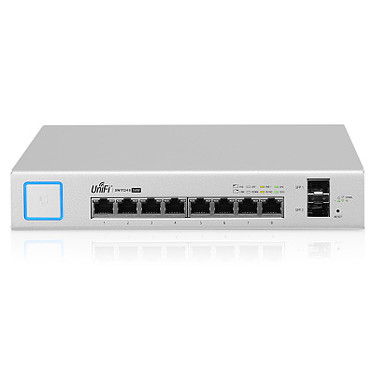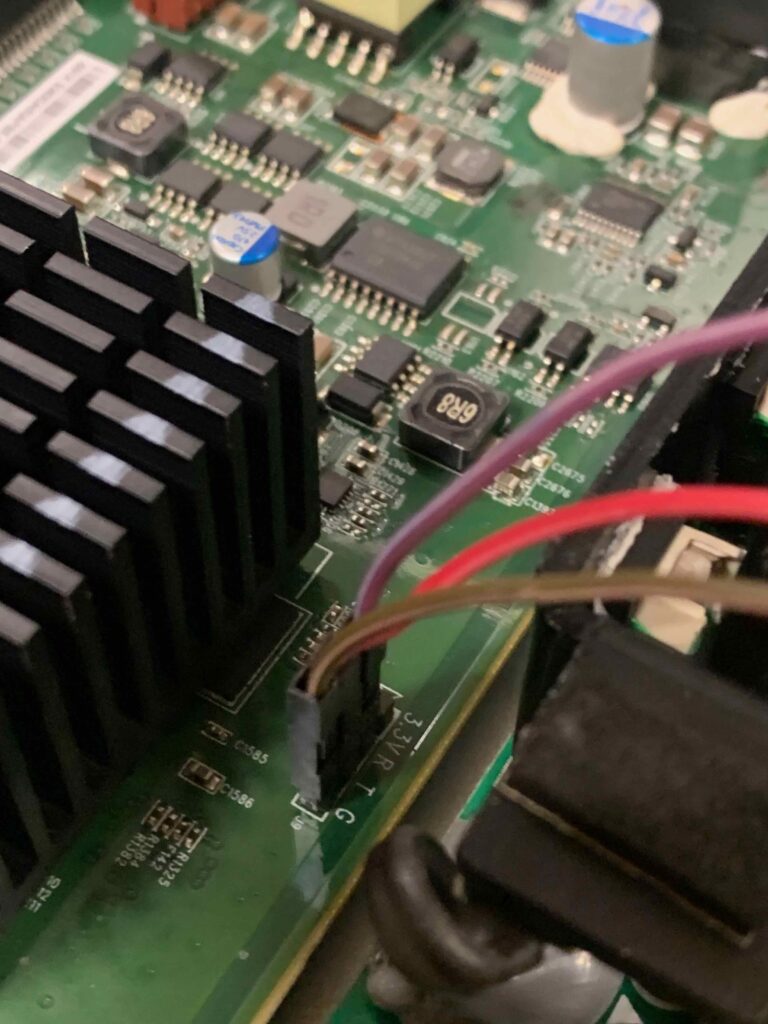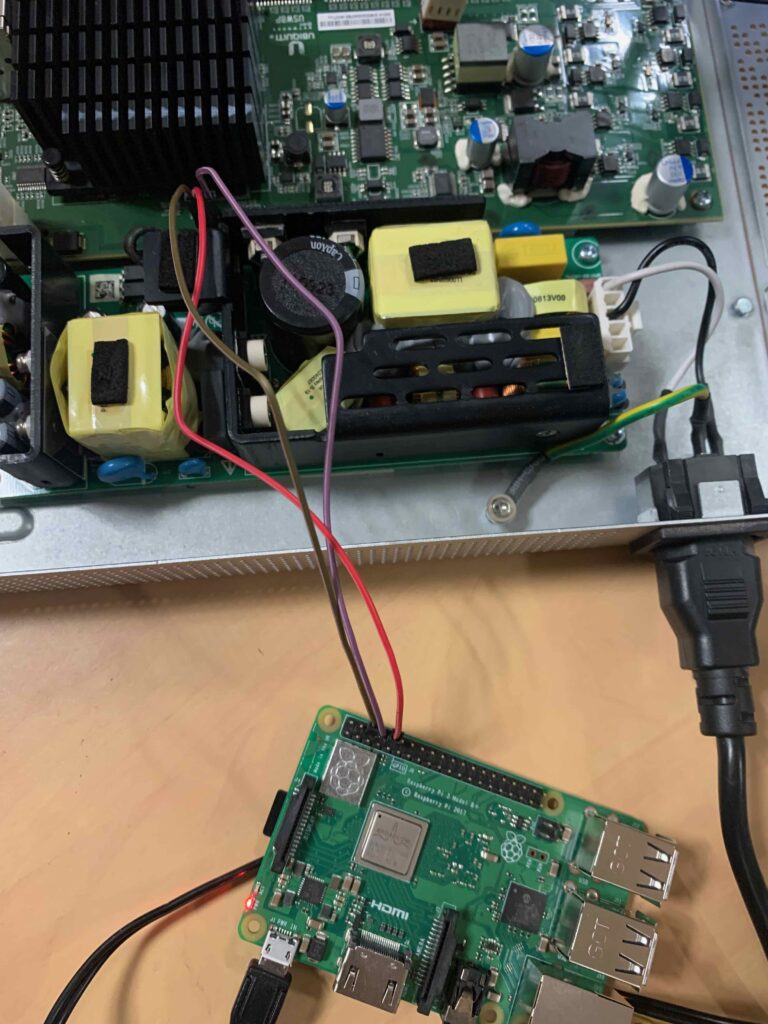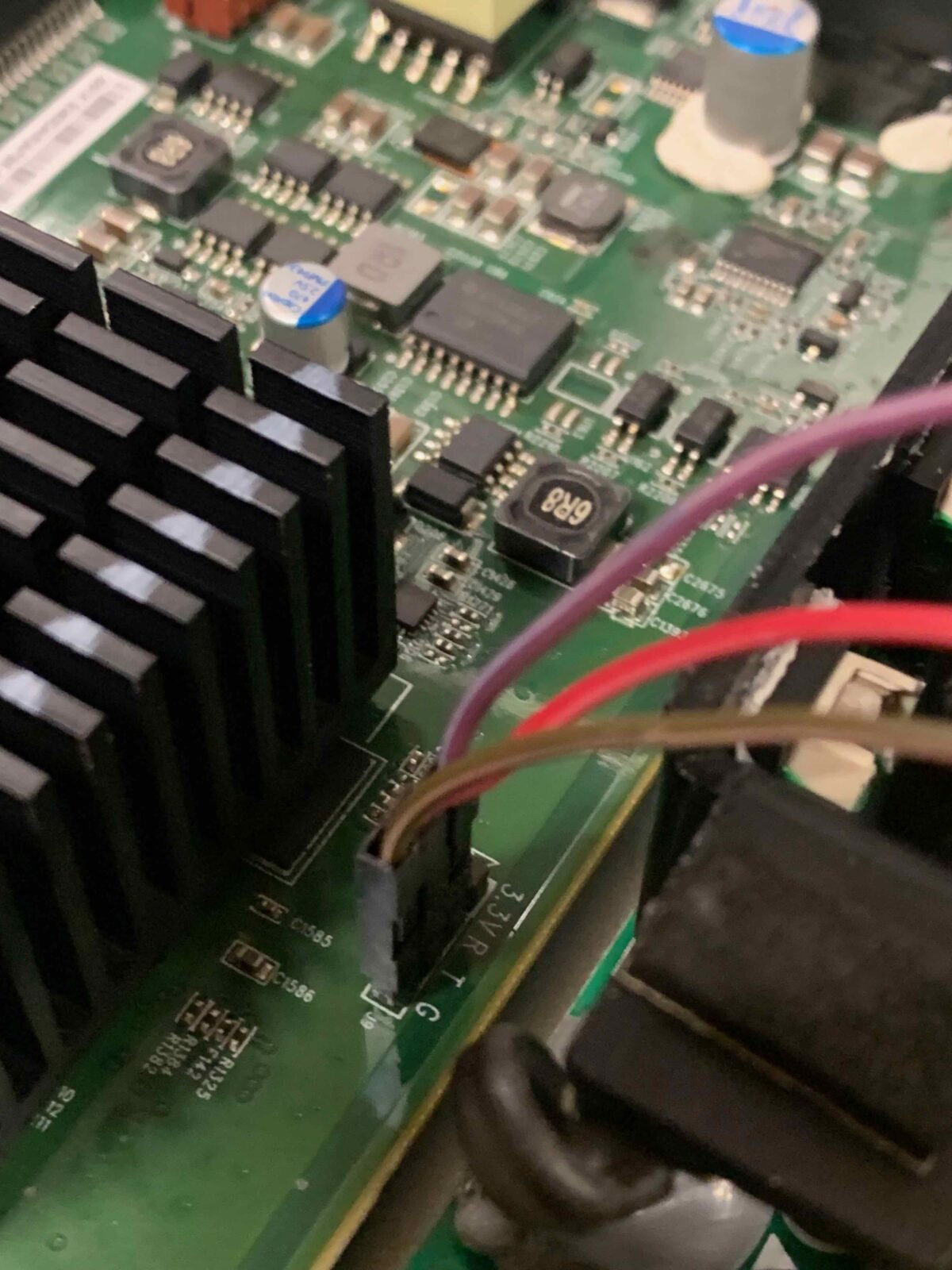J’ai récupéré un switch Ubiquiti US-8-150W. Malheureusement, il ne fonctionne plus.

Nous avons testé la réinitialisation d’usine sans que les ports Ethernet ne soient affectés.
Nous avons ouvert le boîtier et avons découvert un port série.

Nous avons connecté le port série du Raspberry Pi aux broches GPIO14/GPIO15 (lecture/transmission). Nous avons configuré le port à une vitesse de 115200 bauds, une parité de 1, 8 bits de données et aucun contrôle de flux.
Le port GPIO14 du Raspberry Pi est également connu sous le nom de DART (Direct Asynchronous Receiver/Transmitter), ou UART (Universal Asynchronous Receiver/Transmitter). Il est utilisé pour la communication série asynchrone avec d’autres périphériques, tels que des capteurs, des modules radio ou d’autres microcontrôleurs.
Le port GPIO14/DART dispose de deux lignes : une ligne de lecture (RX) pour recevoir les données entrantes et une ligne de transmission (TX) pour envoyer les données sortantes. Il utilise un protocole de communication asynchrone, ce qui signifie qu’il n’y a pas de signal d’horloge synchronisé entre l’émetteur et le récepteur.
La configuration typique du port GPIO14/DART comprend une vitesse de transmission, exprimée en bauds (bits par seconde), une parité (optionnelle pour vérifier l’intégrité des données) et le nombre de bits de données (généralement 8 bits). Le contrôle de flux (flow control) peut être défini sur “none” (aucun contrôle de flux) pour une communication simple entre le Raspberry Pi et le périphérique connecté.
En résumé, le port GPIO14/DART du Raspberry Pi est utilisé pour établir une communication série asynchrone avec d’autres dispositifs, en utilisant des paramètres tels que la vitesse, la parité, le nombre de bits de données et le contrôle de flux appropriés.

Pour désactiver le Bluetooth, vous pouvez exécuter la commande suivante dans le terminal du Raspberry Pi:
sudo systemctl disable bluetooth
Cela empêchera le Bluetooth de démarrer automatiquement au prochain redémarrage.
En ce qui concerne l’activation du port DART (GPIO14), vous devrez modifier le fichier de configuration du Raspberry Pi. Suivez les étapes ci-dessous :
- Ouvrez le fichier de configuration en utilisant la commande suivante :
sudo nano /boot/config.txt
- Recherchez la ligne qui commence par # Enable UART et enlevez le “#” pour la décommenter.
- Pour activer le port DART (GPIO14), ajoutez la ligne suivante après avoir décommenté la ligne précédente :
enable_uart=1
- Enregistrez les modifications en utilisant la combinaison de touches Ctrl+X, puis en appuyant sur Y pour confirmer, et enfin sur Entrée pour sauvegarder le fichier.
- Redémarrez le Raspberry Pi pour que les modifications prennent effet :
sudo reboot
Après avoir suivi ces étapes, le port DART (GPIO14) sera activé et prêt à être utilisé pour la communication série asynchrone. Veuillez noter que la désactivation du Bluetooth et l’activation du port DART peuvent varier légèrement en fonction de la version du Raspberry Pi et de l’OS utilisés.
Installation PICOCOM.
installer Picocom sur Raspberry Pi, vous pouvez suivre les étapes ci-dessous :
- Ouvrez le terminal sur votre Raspberry Pi.
- Assurez-vous que votre Raspberry Pi est connecté à Internet.
- Exécutez la commande suivante pour mettre à jour les paquets disponibles :
sudo apt update
- Une fois la mise à jour terminée, vous pouvez installer Picocom en utilisant la commande suivante :
apt install picocom
- Confirmez l’installation en appuyant sur la touche Y lorsque vous êtes invité.
- Attendez que l’installation soit terminée. Une fois celle-ci terminée, Picocom sera installé sur votre Raspberry Pi.
Picocom est maintenant prêt à être utilisé pour établir une connexion série avec un périphérique via le port DART (GPIO14) que vous avez activé précédemment. Vous pouvez exécuter la commande picocom suivie des paramètres appropriés pour accéder au périphérique série.
Assurez-vous de disposer des privilèges suffisants (par exemple, utilisez sudo picocom si nécessaire) et de spécifier les bons paramètres de communication (vitesse, parité, etc.) pour établir une connexion correcte avec votre périphérique série.
Nous avons ensuite ouvert une connection sur les port picocom -b 115200 /dev/ttyS0 vers le switch.
Voci la soorie écran ou vois un plantage et un reboot.
**************
port 0 is not active!!
**************
In: serial
Out: serial
Err: serial
Unlocking L2 Cache ...Done
arm_clk=400MHz, axi_clk=200MHz, apb_clk=50MHz, arm_periph_clk=200MHz
Disabling outer cache
Net: Board Net Initialization Failed
No ethernet found.
Hit any key to stop autoboot: 0
ubnt_bootsel_init: bootsel magic=a34de82b, bootsel = 1
UBNT application initialized
Boot partition selected = 1
Loading Kernel Image @ 1000000, size = 15728640
Verifying 'kernel1' parition:OK
## Booting kernel from Legacy Image at 01000000 ...
Image Name: Ubiquiti 6.2.14.13855
Image Type: ARM Linux Kernel Image (uncompressed)
Data Size: 15429120 Bytes = 14.7 MiB
Load Address: 00018000
Entry Point: 00018000
Verifying Checksum ... OK
Loading Kernel Image ... OK
OK
boot_prep_linux commandline: console=ttyS0,115200 mem=128M@0x0 mem=128M@0x68000000 mtdparts=spi1.0:768k(u-boot),64k(u-boot-env),64k(shmoo),15360k(kernel0),15424k(kernel1),1024k(cfg),64k(EEPROM) ubntbootid=1
Starting kernel ...
Disabling outer cache
[ 0.000000] Booting Linux on physical CPU 0
[ 0.000000] Linux version 3.6.5 (builder@link-owrt1505-builder) (gcc version 4.7.2 (OpenWrt GCC 4.7.2 unknown) ) #2 SMP Fri Apr 8 14:51:44 UTC 2022
[ 0.000000] CPU: ARMv7 Processor [414fc091] revision 1 (ARMv7), cr=10c53c7d
[ 0.000000] CPU: PIPT / VIPT nonaliasing data cache, VIPT aliasing instruction cache
[ 0.000000] Machine: Broadcom iProc
[ 0.000000] Memory policy: ECC disabled, Data cache writealloc
[ 0.000000] BUG: mapping for 0x18000000 at 0xf0000000 out of vmalloc space
[ 0.000000] BUG: mapping for 0x19000000 at 0xf1000000 out of vmalloc space
[ 0.000000] PERCPU: Embedded 7 pages/cpu @c1d07000 s6272 r8192 d14208 u32768
[ 0.000000] Built 1 zonelists in Zone order, mobility grouping on. Total pages: 61952
[ 0.000000] Kernel command line: console=ttyS0,115200 mem=128M@0x0 mem=128M@0x68000000 mtdparts=spi1.0:768k(u-boot),64k(u-boot-env),64k(shmoo),15360k(kernel0),15424k(kernel1),1024k(cfg),64k(EEPROM) ubntbootid=1 ubootver=usw-v1.1.4.115-g14af1ee6
[ 0.000000] PID hash table entries: 512 (order: -1, 2048 bytes)
[ 0.000000] Dentry cache hash table entries: 16384 (order: 4, 65536 bytes)
[ 0.000000] Inode-cache hash table entries: 8192 (order: 3, 32768 bytes)
[ 0.000000] Memory: 128MB 128MB = 256MB total
[ 0.000000] Memory: 244640k/244640k available, 17504k reserved, 131072K highmem
[ 0.000000] Virtual kernel memory layout:
[ 0.000000] vector : 0xffff0000 - 0xffff1000 ( 4 kB)
[ 0.000000] fixmap : 0xfff00000 - 0xfffe0000 ( 896 kB)
[ 0.000000] vmalloc : 0xc8800000 - 0xf0000000 ( 632 MB)
[ 0.000000] lowmem : 0xc0000000 - 0xc8000000 ( 128 MB)
[ 0.000000] pkmap : 0xbfe00000 - 0xc0000000 ( 2 MB)
[ 0.000000] modules : 0xbf000000 - 0xbfe00000 ( 14 MB)
[ 0.000000] .text : 0xc0018000 - 0xc03528b0 (3307 kB)
[ 0.000000] .init : 0xc0353000 - 0xc0ea5880 (11595 kB)
[ 0.000000] .data : 0xc0ea6000 - 0xc0ecee00 ( 164 kB)
[ 0.000000] .bss : 0xc0ecee24 - 0xc0efd454 ( 186 kB)
[ 0.000000] SLUB: Genslabs=11, HWalign=64, Order=0-3, MinObjects=0, CPUs=1, Nodes=1
[ 0.000000] Hierarchical RCU implementation.
[ 0.000000] RCU restricting CPUs from NR_CPUS=4 to nr_cpu_ids=1.
[ 0.000000] NR_IRQS:292
[ 0.000000] sched_clock: 32 bits at 100 Hz, resolution 10000000ns, wraps every 4294967286ms
[ 0.010000] Calibrating delay loop... 795.44 BogoMIPS (lpj=3977216)
[ 0.050000] pid_max: default: 4096 minimum: 301
[ 0.050000] Mount-cache hash table entries: 512
[ 0.050000] CPU: Testing write buffer coherency: ok
[ 0.050000] CPU0: thread -1, cpu 0, socket 0, mpidr 80000000
[ 0.050000] Setting up static identity map for 0x286c38 - 0x286c90
[ 0.050000] L310 cache controller enabled
[ 0.050000] l2x0: 8 ways, CACHE_ID 0x410000c9, AUX_CTRL 0x0a120000, Cache size: 131072 B
[ 0.050000] Brought up 1 CPUs
[ 0.050000] SMP: Total of 1 processors activated (795.44 BogoMIPS).
[ 0.050000] devtmpfs: initialized
[ 0.060000] NET: Registered protocol family 16
[ 0.060000] DMA: preallocated 256 KiB pool for atomic coherent allocations
[ 0.060000] GENPLL[5] mdiv=40 rate=2000000000
[ 0.060000] Sel=1 Ovr=1 Div=48
[ 0.060000] UART clock rate 50000000
[ 0.080000] bio: create slab <bio-0> at 0
[ 0.080000] Bluetooth: Core ver 2.16
[ 0.080000] NET: Registered protocol family 31
[ 0.080000] Bluetooth: HCI device and connection manager initialized
[ 0.080000] Bluetooth: HCI socket layer initialized
[ 0.080000] Bluetooth: L2CAP socket layer initialized
[ 0.080000] Bluetooth: SCO socket layer initialized
[ 0.080000] Switching to clocksource iproc_gtimer
[ 0.090000] NET: Registered protocol family 2
[ 0.090000] TCP established hash table entries: 4096 (order: 3, 32768 bytes)
[ 0.090000] TCP bind hash table entries: 4096 (order: 3, 32768 bytes)
[ 0.090000] TCP: Hash tables configured (established 4096 bind 4096)
[ 0.090000] TCP: reno registered
[ 0.090000] UDP hash table entries: 128 (order: 0, 4096 bytes)
[ 0.090000] UDP-Lite hash table entries: 128 (order: 0, 4096 bytes)
[ 0.090000] NET: Registered protocol family 1
[ 14.850000] pm_init: Initializing Power Management ....
[ 14.850000] iproc gpiochip add GPIOA
[ 14.850000] GPIOA:ioaddr f0000060
[ 14.850000] GPIOA:intr_ioaddr f0000000 dmu_ioaddr (null)
[ 15.100000] PCIE0: LINKSTA reg 0xbe val 0x1001
[ 15.100000] reg[0xac]=0x10, reg[0xae]=0x42, reg[0xb0]=0x8000, reg[0xb4]=0x2c10, reg[0xb6]=0x10, reg[0xb8]=0x5c12, reg[0xba]=0x65, reg[0xbe]=0x1001, reg[0xc6]=0x40, reg[0xca]=0x1, reg[0xd0]=0x1f, reg[0xd2]=0x8, reg[0xdc]=0x1, PCIE0 link=0
[ 15.350000] PCIe port 1 in End-Point mode - ignored
[ 15.350000] Registering iproc_pmu_device
[ 15.350000] bounce pool size: 64 pages
[ 15.370000] squashfs: version 4.0 (2009/01/31) Phillip Lougher
[ 15.370000] jffs2: version 2.2. (NAND) © 2001-2006 Red Hat, Inc.
[ 15.370000] msgmni has been set to 221
[ 15.370000] Block layer SCSI generic (bsg) driver version 0.4 loaded (major 254)
[ 15.370000] io scheduler noop registered
[ 15.370000] io scheduler deadline registered (default)
[ 15.370000] io scheduler cfq registered
[ 15.380000] Serial: 8250/16550 driver, 2 ports, IRQ sharing enabled
[ 15.380000] serial8250.0: ttyS0 at MMIO 0x18000400 (irq = 123) is a 16550A
[ 15.860000] console [ttyS0] enabled
[ 15.860000] serial8250.0: ttyS1 at MMIO 0x18000300 (irq = 123) is a 16550A
[ 15.890000] brd: module loaded
[ 15.900000] loop: module loaded
[ 15.910000] nbd: registered device at major 43
[ 15.930000] tun: Universal TUN/TAP device driver, 1.6
[ 15.940000] tun: (C) 1999-2004 Max Krasnyansky <maxk@qualcomm.com>
[ 15.950000] Bluetooth: HCI UART driver ver 2.2
[ 15.950000] Bluetooth: HCI H4 protocol initialized
[ 15.950000] Bluetooth: HCI BCSP protocol initialized
[ 15.960000] TCP: cubic registered
[ 15.970000] NET: Registered protocol family 10
[ 15.970000] sit: IPv6 over IPv4 tunneling driver
[ 15.980000] NET: Registered protocol family 17
[ 15.990000] Bluetooth: RFCOMM TTY layer initialized
[ 15.990000] Bluetooth: RFCOMM socket layer initialized
[ 16.000000] Bluetooth: RFCOMM ver 1.11
[ 16.000000] Bluetooth: BNEP (Ethernet Emulation) ver 1.3
[ 16.010000] Bluetooth: BNEP filters: protocol multicast
[ 16.010000] Bluetooth: HIDP (Human Interface Emulation) ver 1.2
[ 16.020000] 8021q: 802.1Q VLAN Support v1.8
[ 16.020000] GENPLL[5] mdiv=40 rate=2000000000
[ 16.030000] qspi_iproc qspi_iproc.1: 1-lane output, 3-byte address
[ 16.030000] m25p80 spi1.0: found mx25l25635e, expected m25p80
[ 16.040000] m25p80 spi1.0: mx25l25635e (32768 Kbytes)
[ 16.040000] 7 cmdlinepart partitions found on MTD device spi1.0
[ 16.050000] Creating 7 MTD partitions on "spi1.0":
[ 16.050000] 0x000000000000-0x0000000c0000 : "u-boot"
[ 16.060000] 0x0000000c0000-0x0000000d0000 : "u-boot-env"
[ 16.070000] 0x0000000d0000-0x0000000e0000 : "shmoo"
[ 16.080000] 0x0000000e0000-0x000000fe0000 : "kernel0"
[ 16.090000] 0x000000fe0000-0x000001ef0000 : "kernel1"
[ 16.090000] 0x000001ef0000-0x000001ff0000 : "cfg"
[ 16.100000] 0x000001ff0000-0x000002000000 : "EEPROM"
[ 16.130000] Freeing init memory: 11592K
[ 16.210000] ubnt_common: module license 'Proprietary' taints kernel.
[ 16.220000] Disabling lock debugging due to kernel taint
[ 16.300000] Data abort at addr=0xc8a10224, fsr=0x1406 ignored.
[ 16.300000] Data abort at addr=0xc8a10224, fsr=0x1406 ignored.
[ 16.320000] gpiodev: reset_timeout=3
...running /sbin/init
init started: BusyBox v1.23.2 (2022-04-08 14:46:27 UTC)
can't run '/etc/rc.d/rc.platform': No such file or directory
Please press Enter to activate this console.
US-8-150W login: ubnt
Password:
BusyBox v1.23.2 (2022-04-08 14:46:27 UTC) built-in shell (ash)
___ ___ .__________.__
| | |____ |__\_ ____/__|
| | / \| || __) | | (c) 2010-2022
| | | | \ || \ | | Ubiquiti Inc.
|______|___| /__||__/ |__|
|_/ https://www.ui.com
Welcome to UniFi US-8-150W!
********************************* NOTICE **********************************
* By logging in to, accessing, or using any Ubiquiti product, you are *
* signifying that you have read our Terms of Service (ToS) and End User *
* License Agreement (EULA), understand their terms, and agree to be *
* fully bound to them. The use of SSH (Secure Shell) can potentially *
* harm Ubiquiti devices and result in lost access to them and their data. *
* By proceeding, you acknowledge that the use of SSH to modify device(s) *
* outside of their normal operational scope, or in any manner *
* inconsistent with the ToS or EULA, will permanently and irrevocably *
* void any applicable warranty. *
***************************************************************************
US-8-150W-US.6.2.14# cd crashd
crashd
-sh: cd: can't cd to crashd
US-8-150W-US.6.2.14# ls
cfg crashlogs
US-8-150W-US.6.2.14# cd crumount: can't remount rootfs read-only
The system is going down NOW!
Sent SIGTERM to all processes
Sent SIGKILL to[ 73.640000] Disabling non-boot CPUs ...
[ 73.640000] Restarting system.
U-Boot usw-v1.1.4.115-g14af1ee6 (Feb 14 2017 - 18:50:54)
DEV ID= 0000db56
SKU ID = 0x8343
DDR type: DDR3
MEMC 0 DDR speed = 667MHz
Validate Shmoo parameters stored in flash ..... OK
Press Ctrl-C to run Shmoo ..... skipped
Restoring Shmoo parameters from flash ..... done
Running simple memory test ..... OK
DDR Tune Completed
DRAM: 256 MiB
WARNING: Caches not enabled
soc_pcie_hw_init : port->reg_base = 0x18012000 , its value = 0x1
PCIe port 0 in RC mode
pos is 172
==>PCIE: LINKSTA reg 0xbe val 0x1001
**************
port 0 is not active!!
**************
In: serial
Out: serial
Err: serial
Unlocking L2 Cache ...Done
arm_clk=400MHz, axi_clk=200MHz, apb_clk=50MHz, arm_periph_clk=200MHz
Disabling outer cache
Net: Board Net Initialization Failed
No ethernet found.
Pour l’instant, nous n’avons pas identifié la source du problème. Nous avons cependant pu envoyer les journaux (logs) au support d’Ubiquiti. L’histoire n’est pas encore terminée.

